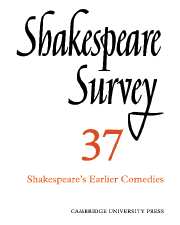Book contents
- Frontmatter
- Criticism of the Comedies up to The Merchant of Venice: 1953–82
- Plotting the Early Comedies: The Comedy of Errors, Love’s Labour’s Lost, The Two Gentlemen of Verona
- The Good Marriage of Katherine and Petruchio
- Shrewd and Kindly Farce
- Illustrations to A Midsummer Night’s Dream before 1920
- The Nature of Portia’s Victory: Turning to Men in The Merchant of Venice
- Nature’s Originals: Value in Shakespearian Pastoral
- 'Contrarieties agree': An Aspect of Dramatic Technique in Henry VI
- Falstaff’s Broken Voice
- ‘He who the sword of heaven will bear’: The Duke versus Angelo in Measure for Measure
- War and Sex in All’s Well That Ends Well
- Changing Places in Othello
- Prospero’s Lime Tree and the Pursuit of Vanitas
- Shakespearian Character Study to 1800
- How German is Shakespeare in Germany? Recent Trends in Criticism and Performance in West Germany
- Shakespeare Performances in Stratford upon–Avon–and London, 1982–3
- The Year's Contributions to Shakespearian Study 1 Critical Studies
- 2 Shakespeare’s Life, Times and Stage
- 3 Editions and Textual Studies
- Index
Shakespearian Character Study to 1800
Published online by Cambridge University Press: 28 March 2007
- Frontmatter
- Criticism of the Comedies up to The Merchant of Venice: 1953–82
- Plotting the Early Comedies: The Comedy of Errors, Love’s Labour’s Lost, The Two Gentlemen of Verona
- The Good Marriage of Katherine and Petruchio
- Shrewd and Kindly Farce
- Illustrations to A Midsummer Night’s Dream before 1920
- The Nature of Portia’s Victory: Turning to Men in The Merchant of Venice
- Nature’s Originals: Value in Shakespearian Pastoral
- 'Contrarieties agree': An Aspect of Dramatic Technique in Henry VI
- Falstaff’s Broken Voice
- ‘He who the sword of heaven will bear’: The Duke versus Angelo in Measure for Measure
- War and Sex in All’s Well That Ends Well
- Changing Places in Othello
- Prospero’s Lime Tree and the Pursuit of Vanitas
- Shakespearian Character Study to 1800
- How German is Shakespeare in Germany? Recent Trends in Criticism and Performance in West Germany
- Shakespeare Performances in Stratford upon–Avon–and London, 1982–3
- The Year's Contributions to Shakespearian Study 1 Critical Studies
- 2 Shakespeare’s Life, Times and Stage
- 3 Editions and Textual Studies
- Index
Summary
A recent article entitled ‘The Emergence of Character Criticism, 1774-1800’ was designed to show that character criticism emerged as a genre in itself in the last quarter of the eighteenth century; during this period ‘essays and whole books are devoted to individual characters’. This present essay, viewing a wider temporal spread, will consider character criticism, not as a literary genre, but as one of the principal divisions of dramatic criticism, corresponding to the second of the six parts, elements, or constituents, of drama distinguished by Aristotle. To avoid confusion, I shall talk of ‘character study’ rather than ‘character criticism’. Character study, of course, had emerged long before 1774.
During the period from 1664 to 1800, critics of various nations made valuable contributions to the discussion of Shakespeare’s characters; I shall try to do justice to the Scots and Germans as well as to native English writers. The questions which have guided my selection of materials are: What were the aims of the early students of character? What methods did they devise? How far were their discussions dependent upon and oriented to theatrical performance? and, Which philosophers apart from Aristotle influenced their aims and methods?
- Type
- Chapter
- Information
- Shakespeare Survey , pp. 141 - 154Publisher: Cambridge University PressPrint publication year: 1984

